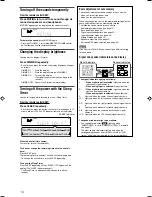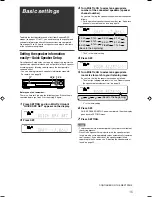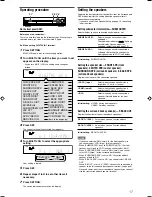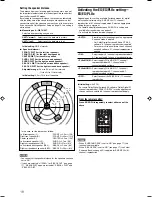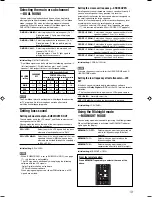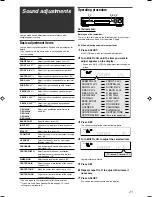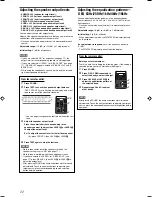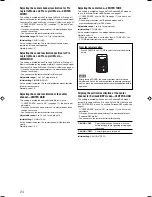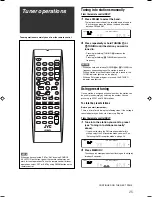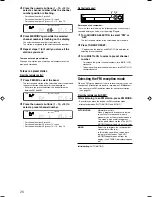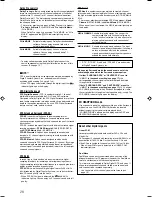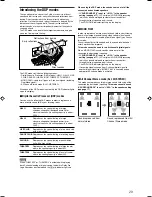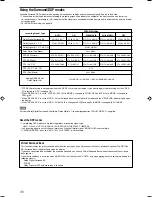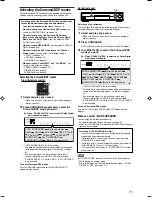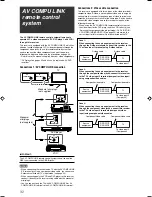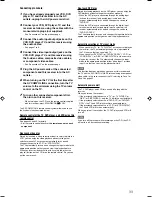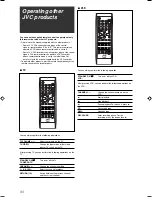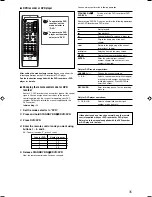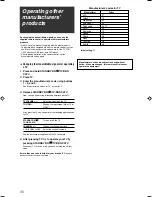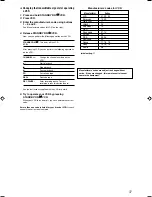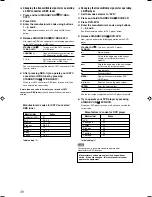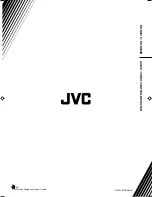
28
DTS Neo:6
DTS Neo:6
is another conversion method to create 6-channel
(plus subwoofer) from analog/digital 2-channel software by using
the high precision digital matrix decoder used for DTS-ES Matrix
6.1ch.
• This receiver provides the following DTS Neo:6 modes—
Neo:6
Cinema
(NEO:6 CINEMA) and
Neo:6 Music
(NEO:6 MUSIC).
When one of them is activated, the NEO:6 indicator lights up on
the display.
NEO:6 CINEMA
Suitable for playing movies. You can get the
same atmosphere with 2-channel software as
with 6.1-channel software. It is also effective for
playing software encoded with conventional
surround formats.
NEO:6 MUSIC
Suitable for playing music software. The front
channel signals bypass the decoder (resulting in
no loss of sound quality) and the surround
signals transmitted through the other speakers
expand the sound field naturally.
**
“DTS”, “DTS-ES”, “Neo:6” and “DTS 96/24” are trademarks
of Digital Theater Systems, Inc.
When using Surround mode, the sounds come out of the
activated speakers which the Surround mode requires.
• If either “SURROUND SPK” or “CENTER SPK” is set to
“
<
NO
>
” in the speaker setting (see page 17),
the
corresponding channel signals are allocated to and emitted
through the front speakers.
• If both “SURROUND SPK” and “CENTER SPK” are set to
“
<
NO
>
” in the speaker setting (see page 17),
JVC’s original
3D-PHONIC processing (which has been developed to create
the surround effect through the front speakers only) is used. The
3D-PHONIC indicator lights up on the display.
3D HEADPHONE mode
If you connect a pair of headphones while one of the Surround
modes is in use, the 3D HEADPHONE mode is activated
without respect to the type of software played back.
“3D HEADPHONE” appears on the display and the DSP and
HEADPHONE indicators light up.
About other digital signals
Linear PCM
Uncompressed digital audio data used for DVDs, CDs, and
Video CDs.
DVDs support 2 channels with sampling rates of 48/96 kHz, at
quantization of 16/20/24 bits. On the other hand, CDs and
Video CDs are limited to 2 channels with 44.1 kHz at 16 bits.
• When Linear PCM signal is detected, the LINEAR PCM
indicator lights up.
Dual Mono
Dual Mono can be easily understood when you think of the
bilingual broadcast for TV programs (however, the Dual Mono
format is not identical with those analog formats).
This format is now adopted in Dolby Digital, DTS, and so on. It
allows two independent channels (called main channel and
sub-channel) to be recorded separately.
• You can select either channel you want to listen to (see
page 19).
Dolby Pro Logic IIx
Dolby Pro Logic IIx
is a newly introduced multi-channel playback
format to convert not only multi-channel software but 2-channel
software into 7.1 channel (or 6.1 channel) that developed from
Dolby Pro Logic II. The matrix-based conversion method used for
Dolby Pro Logic IIx makes no limitation for the cutoff frequency of
the surround treble.
• This receiver provides two types of Dolby Pro Logic IIx modes—
Pro Logic IIx Movie
(PLIIx MOVIE) and
Pro Logic IIx Music
(PLIIx MUSIC).
When Dolby Pro Logic IIx is activated, "PLIIx MOVIE" or "PLIIx
MUSIC" appear and the
indicator lights up on the
display.
PLIIx MOVIE
Suitable for playing any Dolby Surround encoded
software. You can enjoy a sound field with a
natural wraparound effect.
PLIIx MUSIC
Suitable for playing any 2-channel stereo
software. You can enjoy wide and deep 7.1-
channel sounds.
• To enjoy software encoded with Dolby Digital, connect the
source component using the digital terminal on the rear of this
receiver. (See page 10.)
■
DTS
**
DTS is another digital signal compression method, developed by
Digital Theater Systems, Inc., and enables multi-channel
encoding and decoding (1ch up to 6.1ch).
• When DTS signal is detected through the digital input, the
indicator lights up on the display.
DTS Digital Surround
DTS Digital Surround
(DTS) is another discrete 5.1 channel
digital audio format available on CD, LD, and DVD software.
Compared to Dolby Digital, the DTS Digital Surround format has a
lower audio compression rate which enables it to add breadth and
depth to the sounds reproduced. As such, DTS Digital Surround
features natural, solid, and clear sound.
DTS Extended Surround (DTS-ES)
DTS-ES
is another multi-channel digital encoding format.
It greatly improves the 360-degree surround impression and
space expression by adding the third surround channel—surround
back channel.
DTS-ES includes two signal formats with different surround signal
recording methods—
DTS-ES Discrete 6.1ch
(ES DISCRETE)
and
DTS-ES Matrix 6.1ch
(ES MATRIX).
DTS-ES Discrete 6.1ch
has been designed to encode (and
decode) a 6.1-channel signal discretely to avoid interference with
each channel.
DTS-ES Matrix 6.1ch
has been designed to add an extra
surround channel to DTS Digital Surround 5.1-channel. By using a
matrix encoding/decoding method, an additional “surround back”
channel signal is encoded (and decoded) in both the left and right
surround channel signals.
DTS 96/24
In recent years, there has been increasing interest in higher
sampling rates both for recording and for reproducing at home.
Higher sampling rates allow wider frequency range and greater bit
depths provide extended dynamic range.
DTS 96/24
is a multi-channel digital signal format (fs 96 kHz/24
bits) introduced by Digital Theater Systems, Inc. to deliver “better-
than-CD sound quality” into the home.
• When DTS 96/24 signal is detected, the
and 96/24
indicators light up. You can enjoy its 5.1-channel sound with full-
quality.
27-31RX-D201S[J]_f.p65
05.2.7, 9:21
28

